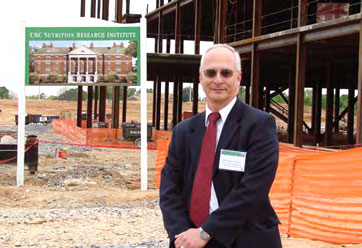School's Nutrition Research Institute gearing up in Kannapolis, NC
| October 05, 2007 | |
| Fact: What we eat — and — how much — plays a huge role in how long and how well we live. Finding: Future: 
Dr. Steven Zeisel at NRI research building site
“We have much of the methodology available that could allow us to understand why people’s metabolisms are so different,” says Dr. Steven Zeisel, Kenan Distinguished University Professor of nutrition and pediatrics in the UNC School of Public Health and the School of Medicine. “But more work needs to be done to make sense of these pieces we have. The beginnings of the techniques are there, but we have much refining to do.” Zeisel is director of the Nutrition Research Institute (NRI), a new part of the UNC School of Public Health located on the N.C. Research Campus in Kannapolis, about 30 miles northeast of Charlotte, N.C. The campus is a public-private partnership, spearheaded by David Murdock, former CEO of Dole Food Company, Inc. At age 84, Murdock appears to have more energy and stamina than many people half his age. “Mr. Murdock believes his diet is the reason he is so healthy at his age,” Zeisel says. “And he is convinced nutrition holds the key to improving all our lives and health.” So is Zeisel, whose distinguished career has made him one of the top nutrition researchers in the world. Zeisel’s research combines studies of molecular mechanisms for how nutrients function with human studies on nutrient requirements and effects. NRI will use cutting-edge genomic and metabolomic biotechnology to develop innovative approaches to understanding the role of diet and activity in normal brain development, in the prevention of cancer and in the prevention and treatment of obesity and eating disorders. Metabolomics is the systematic study of metabolites — small molecules generated in the process of metabolism. Why center this research in Kannapolis, which was a textile mill town until the giant Pillowtex plant (once owned by Murdock) closed in 2003? Because — with a $1 billion-plus investment by Murdock, $30 million a year from the state, huge investments from local governments and other businesses, including Red Hat and Biomarker Group — the N.C. Research Campus is drawing researchers from all over the country. N.C. State University already has broken ground on its Institute for Advanced Fruit and Vegetable Science. Duke University has committed to basing research efforts there, as have a number of other universities in the state, and the N.C. Community College System. “Here, we can bring minds together that can approach these issues from many different perspectives,” Zeisel says. “We can do this here on a level beyond anything else being done in the United States.” They all will have access to new facilities and state-of-the-art equipment. For example, Murdock purchased the world’s first activelyshielded 950 MHz superconducting magnet, a two-story, eight-ton machine that will allow scientists to delve into the three-dimensional structures of molecules and study their interactions with greater depth and clarity. The equipment will be housed in the David H. Murdock Core Laboratory facility on the N.C. Research Campus. The Core Lab building was the first to be built, followed closely behind by NRI’s 125,000-squarefoot research building, to be completed in April 2008. Zeisel plans to recruit 18 faculty members and their research teams. They will work in Kannapolis and hold appointments at UNC-Chapel Hill. “This institute will result in breakthroughs in how we use nutrition to enhance human health,” Zeisel says. “We will be able to tailor recommendations on nutrition to the individual and not just give general guidelines. We can change how nutrition is practiced, and by so doing, change people’s lives.” For more information, visit www.uncnri.org/. # # # Carolina Public Health is a publication of the University of North Carolina at Chapel Hill School of Public Health. To subscribe to Carolina Public Health or to view the entire Fall 2007 issue in PDF, visit www.sph.unc.edu/cph. |
|
